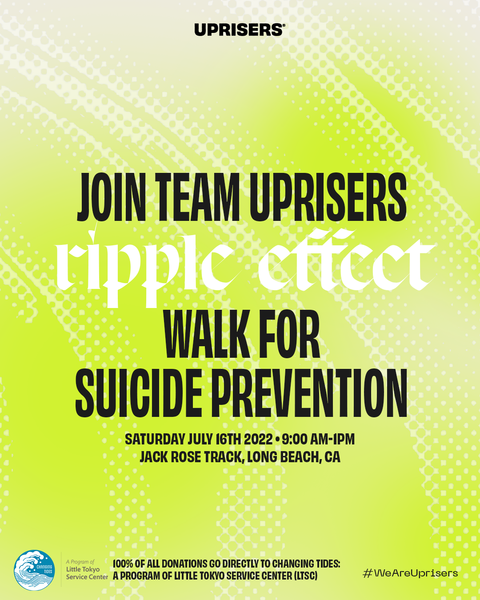We remember their names. We walk for their stories. In time for Minority Mental Health Month, we’ve partnered with Little Tokyo’s Changing Tides for their Ripple Effect: Walk for Suicide Prevention. The fundraiser was our ripple effect – shifting culture around mental health within the AAPI community. And this is just the beginning.
When we think of July, we think of a month adored for its warm weather, surge in vacation photo dumps on Instagram – undoubtedly a real phenomenon – and prolonged summer days. While we find ourselves lost in the ebb and flow of life, July is also observed as National Minority Mental Health Awareness Month, a national effort to bring to attention the inequities of systems, accessibility and culturally-sensitive opportunities that impact BIPOC individuals’ mental health. One-size does not fit all here.
UPRISERS teamed up with Changing Tides, a program of Little Tokyo Service Center in Los Angeles, for the Ripple Effect: Walk for Suicide Prevention. This past Saturday, we were joined by 350 walkers and raised over $102,000 to fund efforts to support mental health and suicide prevention in the AAPI community.
Changing Tides, which ignited into ideation November 2017 after an event that sparked a dialogue on the importance of mental health within the Asian American community, has been working towards shifting stigma around mental health and generating greater awareness for reflection and unity. This is us doing our part and, together, showing up for a cause bigger than ourselves.
This is what happens when community comes together. Thank you to everyone who donated, showed up and supported. You can initiate a ripple effect. Donations are happening til the end of the year.
And if you haven’t heard, July 16 marks the launch of the 988 Suicide & Crisis Lifeline. Simply call or text the numbers 9-8-8 and you’ll be connected to the existing network of more than 200 local crisis call centers around the country. It’s free and available 24/7.
Oftentimes when people are experiencing a mental health crisis, their initial impulse to seek help is to dial 9-1-1, but the problem with that is 9-1-1 wasn’t built to address mental health needs. So instead of receiving the appropriate support, individuals are sent to emergency rooms or left interacting with law enforcement, which seems like the last thing on someone’s mind to do during a mental health crisis.
Ditching the previous 10-digit number 1-800-273-TALK(8255), which will continue to function indefinitely, the new, modeled after 9-1-1 number is an effort to transform the mental health care system – making help easily accessible.






